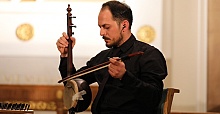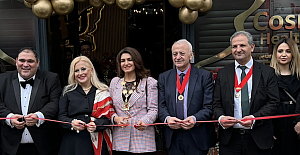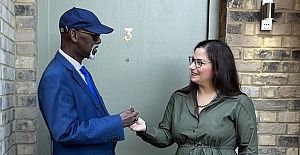Living across more than two cultural spaces demonstrates the different experiences young people face. It is seen as problematical in some cases. 'Being in the middle of two cultures' is a phrase used by the families and community organisations to describe the positioning of young people. Some heads of community organisations and families believe that young people are not successful at school and have serious identity problems because they are ‘between two cultures’. Some believes that young people being neither Turkish nor British and not belonging to a particular culture is problematic.
In the case of Kurdish, Turkish and Turkish- Cypriot youth, ethnic identity and the relationship with the country of origin is shaped by family and community organisations. However, the connection of young people to the country of origin and ethnic identity might be different than their parents’ because they grew up in another country and are more familiar with the lifestyle of the receiving country. In engaging with various different cultural repertoires, young people experience complex identity options which they can choose or switch around. These various complex identity options can be practiced within a transnational social space which includes the cultural resources from the sending and receiving country through social networks. Unlike their parents, young people are deeply involved in the negotiation of ethnic identity because they interact with different ethnic identities more than their parents do.
On the one hand, there are some Kurdish, Turkish and Turkish-Cypriot youth who move across various cultures and do not identify with bounded cultures and ethnicity. On the other hand, some of these young people describe themselves according to ethnicity and culture, are influenced by family, community organisations, and their ethnic enclave. But in both cases, identity perceptions of young people are formed by their lived experiences. In this sense, they are ‘doing their identity’ because they negotiate it in their everyday life which is shaped by them more than being passively received.
Young people learn about the country of origin and its culture first from their families, as they do not have a historical past there or any memories of the country of origin. Because their relation to the country of origin is not based on historical past and memory, consequently they do not feel part of the collective category of the country of origin. Their everyday life experiences across the borders of nation-states constructs the ways these young people position themselves with reference to Turkish, Kurdish and British culture. In everyday life, these young people enter into different spaces and participate in different cultural and identical positions, such as at school, at home, in their neighbourhoods, at celebrations, with their peers, etc. They have different social identities, such as migrant, youth, British, Turkish- Cypriot, Kurdish and Turkish, and they do not conform entirely to any single category.
The positioning of these young people might differ in relation to their everyday life experiences, and they might not define themselves in relation to any single dimension of identity positioning, such as being ‘Turkish’ or ‘British’. Many young people are constantly moving across different cultural spaces, creating their own identity in the process. Their perceptions about their identity positioning are transformed through their everyday life experiences. As a result of experiencing Turkish, Kurdish and British culture in everyday life, these young people construct transnational experiences which include everyday experiences across the borders. The outcomes of the popular discourse of being in ‘between two cultures’ therefore needs to be analysed in relation to the everyday experiences of young people.
The Popular Discourse 'Being between Two Cultures'
Living across more than two cultural spaces demonstrates the different experiences young people face.
18 Haziran 2012 Pazartesi 09:21
reads.




 The candidates vying to be the next London mayor
The candidates vying to be the next London mayor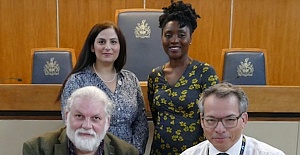 Enfield Council commits to anti-racism and diversity pledge
Enfield Council commits to anti-racism and diversity pledge President Erdogan promised supporters his party would learn its lessons from the defeat
President Erdogan promised supporters his party would learn its lessons from the defeat Mayor of London and London Assembly elections
Mayor of London and London Assembly elections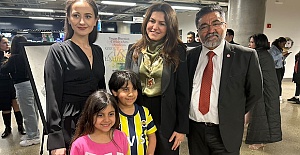 Future Painters Exhibition at Tottenham Hotspur Stadium
Future Painters Exhibition at Tottenham Hotspur Stadium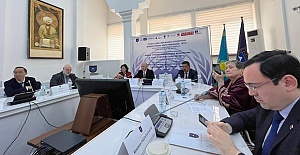 Models of Teaching International Journalism for Sustainable Development
Models of Teaching International Journalism for Sustainable Development UK and US scientists have been working on eclipse observations
UK and US scientists have been working on eclipse observations Unsupportive goverment policies jeopardizing foundation of UK food security
Unsupportive goverment policies jeopardizing foundation of UK food security English Premier League leaders Arsenal will visit title contenders
English Premier League leaders Arsenal will visit title contenders Liverpool meet Atalanta and West Ham face Bayer Leverkusen
Liverpool meet Atalanta and West Ham face Bayer Leverkusen Arsenal face Bayern Munich and Manchester City play Real Madrid
Arsenal face Bayern Munich and Manchester City play Real Madrid UK Transfer deadline day, the transfer window closes tonight
UK Transfer deadline day, the transfer window closes tonight Europe's travel strikes: Flight and train disruption you can expect in April
Europe's travel strikes: Flight and train disruption you can expect in April Enfield Council website achieves digital inclusion recognition
Enfield Council website achieves digital inclusion recognition Enfield Council’s Planning Enforcement team goes from strength to strength
Enfield Council’s Planning Enforcement team goes from strength to strength UK's first Turkish Shacklewell Lane Mosque faces threat to its future
UK's first Turkish Shacklewell Lane Mosque faces threat to its future



